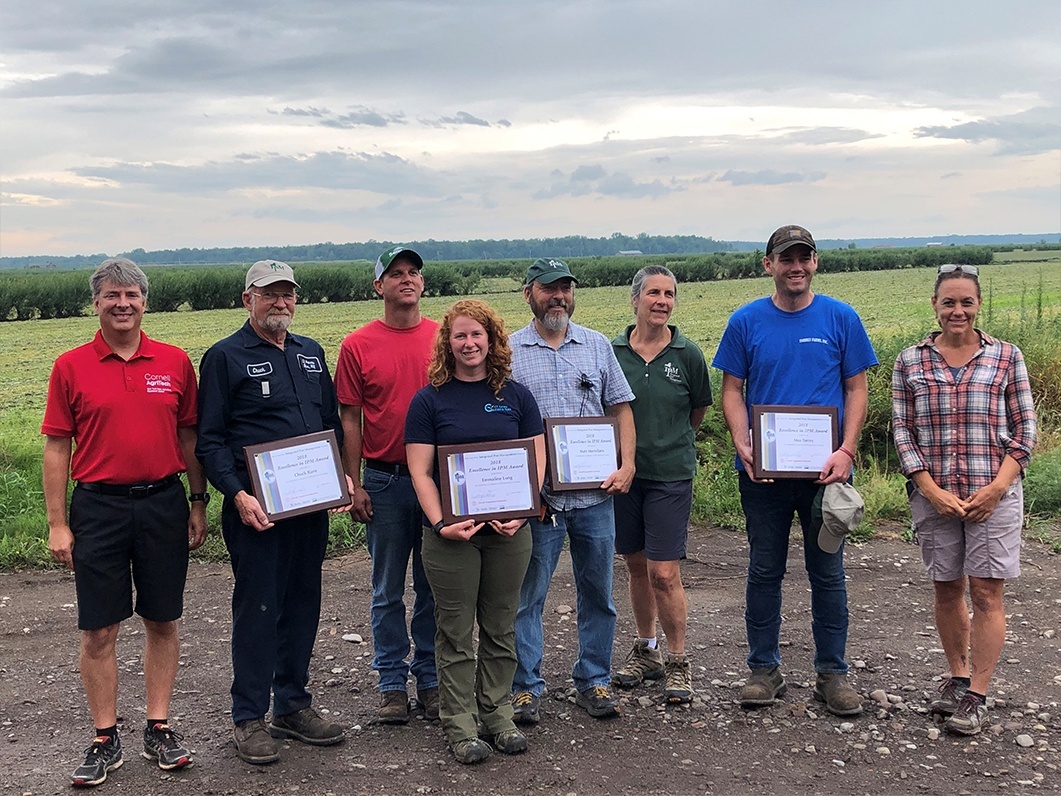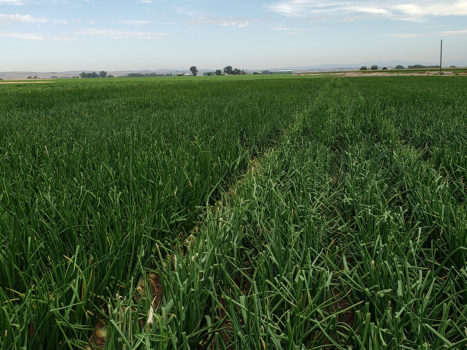Onion growers in Elba, NY, were recently lauded for their growing practices, including pest management, by the New York State Integrated Pest Management Program through Cornell University.
The six growers were recognized at a July 30 ceremony held during their weekly Muck Donut Hour. They are Matt Mortellaro, Guy Smith, Chuck Barie, Emmaline Long and Mark and Max Torrey, each praised for achievements with the Excellence in Integrated Pest Management (IPM) Award from the New York State Integrated Pest Management Program (NYSIPM) at Cornell.
The release said, “The six are muck onion farmers in Elba, NY, who meet weekly during the growing season for what is known as Muck Donut Hour, to discuss crop protection tactics.” It continued, “The award honors individuals who encourage the adoption of IPM in their businesses, schools, communities, and farms, and who develop new tools and tactics for sharing these practices.”
New York’ onions grown in muck soil, described as “organically rich former swampland where production practices are unique and intense,” are one of the Empire State’s most valuable crops, “with an average value of $34.6 million.”
The release said, “In the Elba muck and surrounding pockets in Orleans, Genesee, and Livingston counties, eight farms produce 40 percent of the New York onion acreage on 3,000 acres. Mortellaro, Triple G, CY, and Big O farms account for almost 75 percent of that production.”
Back in 2005, the release continued, “onion thrips infestations were nearly uncontrollable in New York. Populations of the vegetable-loving insect were resistant to multiple insecticides, and the hot and dry conditions created a worst-case scenario, causing crop losses exceeding 30 percent.”
Working with Cornell researchers, the Elba growers went on to “host large-scale demonstrations on their land, in an attempt to understand the biology, ecology, and management of thrips.” As a result, a practical thrips management program was created, which “includes regular scouting of onion fields followed by sparing use of insecticides designed to minimize resistance” according to Brian Nault, Professor of Entomology at Cornell AgriTech.
Today the Elba growers successfully manage their thrips infestations, averaging between one-to-four fewer insecticide applications and saving an average of $113/acre, or approximately $6,000-$226,000 per farm per year.
“In addition to regular scouting, the other key tool in the IPM arsenal is information exchange and discussions at the Muck Donut Hour, which Christy Hoepting, Senior Extension Associate with the Cornell Vegetable Program, describes as a way she keeps her ‘finger on the pulse’ of the pest complex each year,” the release said.
The Muck Donut Hour itself has been a CCE tradition for more than two decades, giving growers and researchers the opportunity to “discuss the latest research findings, scouting and spray reports.”
Hoepting praised the “willingness of the muck onion farmers to entrust their crops to Cornell’s research, and their transparency in sharing spray records,” and she said, “The Elba growers are undeniably brave, [and] to so wholeheartedly adopt IPM practices demonstrates the extent of their faith in Cornell’s research on their farms. The risk of a pest spiraling out of control in a high-value onion crop is frightening. Clearly, these growers believe in solid science and go above and beyond to support it.”
Steven Beer, Professor Emeritus of Plant Pathology and Plant-Microbe Biology at Cornell University, says, “without the cooperation of the Elba onion growers, it is not likely that so many IPM-themed tactics would have been adequately tested under real grower conditions. They set the standard for other growers.”
Learn more about Integrated Pest Management at www.nysipm.cornell.edu.


